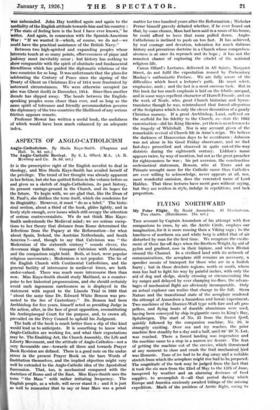DIPLOMACY AT ITS BEST
TgIs is a pleasant story to read. It is the story of how for over a century the two great English-speaking nations have settled the differences between them not merely peaceably and without recourse to war, but in a spirit of the greatest good fellowship and good will. Differences enough there have been ; that was inevitable from the mere circumstances of the birth of the United States, from the continuous contact of the two peoples on the North American continent, from the dominating position of Great Britain in a world in which the young Republic was so strenuously thrusting into pro- minence and power. And there have been hotheads and mal- contents enough to exacerbate ill-feeling whenever opportunity arose ; but as one reads Professor Mowat's succinct and straightforward narrative of the adjustment of incident after incident, difficulty after difficulty, what chiefly impresses one is the persistent good-humoured common sense with which statesmen and diplomatists on both sides have proceeded on the assumption—whatever the popular feeling of the moment might be—that anything but a spirit of friendly accommoda- tion between the countries was impossible.
On the whole this determined will-to-peace has been even more creditable on the American side than on the British. The British negotiators have always known that in seeking friendship with America they had their people behind them. In the United States there was never a time when a large and clatithrous section of the population was not actively Anglo- phobe, and ever since the days of Washington it has taken some courage in an American public man to proclaim a desire to be on good terms with England. British statesmen, how- ever, have in general been so extraordinarily nice towards the representatives of the United States, so personally cordial, and so willing to make all possible concessions, that the path of the American negotiators has been as smooth as possible, and it would be idle to pretend that the balance of profit in the bargaining has not been in favour of the United States. There have been individual trouble-makers on either side. If there is nothing in the British record to compare with Roose- velt's robust big-stickism in the Alaska Boundary case, we can match Lord Wellesley's dictatorial temper, which con. tributed largely to the outbreak of the War of 1812, against Smriner's bellicosity on the Alabama Claims ; the Sackville- West indiscretion against the Cleveland-Olney gaffe in the matter of Venezuela. But whenever foolishness or ill- humour has precipitated what looked like a dangerous crisis, it has only served to throw into stronger relief the evident determination of the best people in both countries that any- thing like real trouble must be avoided.
Nothing could have been pleasanter than the atmo- sphere which produced the Friendly Conventions of 1818. "Seldom," says Professor Mowat, again, of Webster's conduct of the Caroline incident, "has an exasperating diplomatic incident been so gracefully and generously closed as was done by the act of the American Secretary of State." Of the Ashburton Treaty he says: "Never have diplomatic negotia- tions been conducted on a higher plane." The settlement of the Oregon question was "a great credit" both to the British Minister, Pakenham, and to President Polk and James Buchanan. And again and again we get glimpses of delightful personal relationships between individual negotiators, as between Gallatin and the Castlereaghs and between Lord Granville and James Russell Lowell, as, in our own time, between Walter Page and Sir Edward Grey. Rush_ had an immense liking for Lord Liverpool. Whitelaw Reid's admira- tion of King Edward as "the mainstay of European peace ". Was unbounded. John Hay testified again and again to the cordiality of the English attitude towards him and his country
The state of feeling here is the best I have ever known," he 'writes. And again, in connexion with the Spanish-American War : "If we wanted it—which, of course, we do not—we could have the practical assistance of the British Navy."
Between two high-spirited and expanding peoples whose Interests touch at so many points, effervescences of pique and jealousy must inevitably occur ; but history has nothing to show comparable with the spirit of obstinate and fundamental 'friendliness which has guided the diplomatic relations of the two countries for so long. It was unfortunate that the plans for Celebrating the Century of Peace since the signing of the ,Treaty of Ghent on Christmas Eve of 1814 were frustrated by untoward circumstances. We were otherwise occupied (as also was Ghent itself) in December, 1914. Since then another decade has slipped away. The bonds between the English- speaking peoples seem closer than ever, and so long as the same spirit of tolerance and friendly accommodation governs the diplomacy of the two countries the likelihood of any serious friction appears remote.
Professor Mowat has written a useful book, the usefulness of which would have been much enhanced by an adequate index.











































 Previous page
Previous page